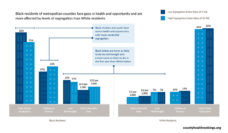A Black woman, psychotic and pregnant, is admitted to a psychiatric emergency room only to be discharged “to the streets.” Several health care providers, noting her history of methamphetamine use, claim “she’s always like this,” suggesting she is inherently inferior and unworthy of treatment. They make no effort to contact her family, provide prenatal care, or admit her to the hospital, carelessly neglecting to help her and her unborn child.
Two Black parents refuse a potentially life-saving organ transplant for their child because they are terrified and do not understand the complex care needed before and after surgery. The pediatricians consider reporting them to child protective services for neglect. Only when a consulting psychiatric service recognizes the parents’ legitimate fears and the absence of appropriate education do the pediatricians refocus on improving communication and empathy, rather than reporting.
Though racism is a public health crisis of global concern, few strategies to eliminate it from clinical care have been established. Antiracist approaches that identify and challenge the racism shaping care are crucial for reducing health disparities and preventing real-world examples of racist assumptions like these.
One particular strategy, inspired by Ibram X. Kendi’s scholarship, asks providers to recognize the racism living and breathing within each of us and the potential for abusing our power and perpetrating harmful discrimination during care. Slowing down and checking the automatic thinking driving bias allows providers to identify the racism influencing care.
Antiracism during individual clinical encounters is no substitute for the structural reforms requisite for abolishing enduring racial health disparities.
To echo a recent New England Journal of Medicine editorial, “Slavery has produced a legacy of racism, injustice, and brutality that runs from 1619 to the present, and that legacy infects medicine as it does all social institutions.” When providers claim a psychotic pregnant Black woman is “just like that” and discharge her with no plan for shelter, they are advancing the narrative of Black mental inferiority and physical imperviousness to harm that 19th century doctors used to justify slavery. They are continuing the assault on Black women’s reproductive health that was foundational to slavery, maintained through force-sterilization campaigns lasting through the 1970s, and enduring in their higher risk for maternal mortality today.
The war on drugs, fabricated in the 1970s as a backlash to Black advancement from the Civil Rights Movement, is reinforced by an ideology of Black criminality and violence perpetuated, in part, by American psychiatrists. Other health care providers are equally prone to the punishment and policing of Black lives found in schools and law enforcement. Common clinical practices, like administering forced intramuscular sedatives, discharging someone who should be hospitalized, and reporting a family to child protective services become coercive when the racism driving them proceeds unchecked.
Antiracism during individual clinical encounters is no substitute for the structural reforms requisite for abolishing enduring racial health disparities. But it is one tool providers can use to take immediate responsibility for the lives right before their very eyes. By identifying the racism and white supremacy assaulting their patients, providers honor their oath to protect, rather than harm.
Photo via Getty Images














